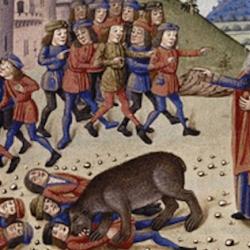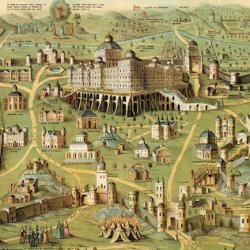In his commentary on 1 Kings 17-19, M. B. Van’t Veer has this insightful comment about the difference between OT and NT: “We could say that the Lord attacked the powers of darkness, the kingdom of satan on earth [in the old covenant] within the boundaries of Canaan. The land of rest was also the land of struggle, the land where the Kingdom of the Lord did battle with the powers of Satan. There the blows rained down as the two powers confronted each other in the full light of the complete antithesis between them. There the light was revealed to combat the darkness. The chariots of the Lord of hosts were mobilized and arranged in ranks to charge at the forces of the evil one. The Seed of the woman struggled against the seed of the serpent, waiting for and working toward the hour of full revelation when the battle would spill across the borders of the ‘promised land’ to the ends of the earth because of a victory in principle.” When he moved to Zarephath, therefore, Elijah did not carry on a battle with Baal: “We should not say that Elijah was wrong in this regard. He was simply acting in accordance with the Old Testament dispensation, in which the struggle of the Seed of the woman and the seed of the serpent was carried on within the borders of Canaan.” After Pentecost, however, “the church’s battle entered a new phase. Paul could not flee the battle or call a certain area neutral or write off some territory as under enemy control. Wherever he went, he had to unleash the battle.”
This is superb, on many levels. It gives some additional nuance and depth to NT Wright’s suggestion that God was concentrating sin and uncleanness in Israel, funneling it through the holy nation, so that it could rest on the Messiah, who would bear it away. Along similar lines, it helpfully shows the paradoxical character of Israel’s specialness: On the one hand, Israel is the object of Yahweh’s favor above all other nations; but on the other hand, and precisely for that reason, Yahweh is at war with Israel’s sin and rebellion in a way He is not at war against the sin and rebellion of humanity as a whole. This is the double-sidedness of being a “holy” people; holiness brings both privilege and danger. This helps to account for the apparent “failure” of Israel. Israel often seems to be much worse than other nations, so much more stiff-necked and bone-headed. But the whole point of choosing Israel out was so that Yahweh could wage a battle to the death with Sin, Death, and Satan, and having triumphed, raise Israel up again.
That it is Israel’s calling to bear the weight of God’s battle against sin is evident from the context of Abraham’s call in Genesis 12: Yahweh will no longer flood the earth; the nations have been scattered and He will no longer deal with them directly; instead, He will pursue His holy war against sin within the house of Abraham. This paradigm also means that Israel’s history is exemplary of the history of the human race in a particular way: The warfare that Yahweh carried on against Israel in the Old Testament is now being waged everywhere. In the past, the NT tells us, God “winked” at Gentile sin and rebellion, and (as it were) concentrated all His energies on Israel. No more: Now, He’s after every nation, and He won’t rest until all the nations of the earth have died and risen in Jesus, the true Israel.















